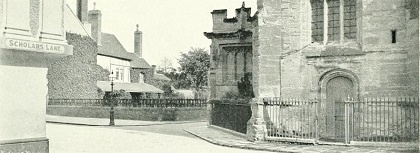Shakespeare's Income
From The Facts About Shakespeare. William Allan Neilson and Ashley Horace Thorndike.
While it is probable that the sale of Shakespeare's poems brought him in some financial return, he is not
likely to have profited from the publication of his plays. The playwright at that time sold his product to
the manager or company, and thereby gave up all rights. To the end of the sixteenth century managers usually
paid from £5 to £11 for a new play, adding a bonus in the case of success, and sometimes a share of the proceeds of the second performance. During the first decade of Shakespeare's activity as a dramatist, then, we
may calculate that he obtained for about twenty-one plays an average of about £10 each.... [The relative value of £10 is £2,120 in 2014. -- Shk Online.] During his second decade the prices for plays had so risen that he may be estimated to have received about twice as much from this source as in the early half of his career.
More profitable than playwriting was acting. Lee estimates Shakespeare's salary as an actor before 1599
at £100 a year at least, exclusive of special rewards for court performances, and we know that by 1635 an
actor-shareholder, such as Shakespeare latterly was, had a salary of £180. Besides this, he became about
1599 a sharer, with Heming, Condell, Philips, and others, in the receipts of the Globe Theater, erected
in 1597-8 by Richard and Cuthbert Burbage. The annual income from a single share was over £200,
and Shakespeare may have had more than one. In 1610 he became a sharer also in the smaller Blackfriars
Theater, after it had been acquired by the Burbages.
The evidence thus accumulated of Shakespeare's having acquired a substantial fortune is corroborated
by what we know of the earnings of other members of his profession, and it leaves no mystery about the source
of the capital which he invested in real property in Stratford and London.
How to cite this article:
Neilson, William Allan, and Ashley Horace Thorndike. The facts about Shakespeare. New York: The Macmillan company, 1913. Shakespeare Online. 20 Jan. 2014. < http://www.shakespeare-online.com/biography/shkworth.html >.
______
More Resources
 Queen Elizabeth: Shakespeare's Patron Queen Elizabeth: Shakespeare's Patron
 King James I of England: Shakespeare's Patron King James I of England: Shakespeare's Patron
 The Earl of Southampton: Shakespeare's Patron The Earl of Southampton: Shakespeare's Patron
 Going to a Play in Elizabethan London Going to a Play in Elizabethan London
 The Shakespeare Sisterhood - A Gallery The Shakespeare Sisterhood - A Gallery
 Worst Diseases in Shakespeare's London Worst Diseases in Shakespeare's London
 Preface to The First Folio Preface to The First Folio
 Shakespeare's Pathos - General Introduction Shakespeare's Pathos - General Introduction
 Shakespeare's Portrayal of Childhood Shakespeare's Portrayal of Childhood
 Shakespeare's Portrayal of Old Age Shakespeare's Portrayal of Old Age
 Shakespeare's Attention to Details Shakespeare's Attention to Details
 Shakespeare's Portrayals of Sleep Shakespeare's Portrayals of Sleep
 Publishing in Elizabethan England Publishing in Elizabethan England
 What did Shakespeare drink? What did Shakespeare drink?
 Ben Jonson and the Decline of the Drama Ben Jonson and the Decline of the Drama
 Publishing in Elizabethan England Publishing in Elizabethan England
 Alchemy and Astrology in Shakespeare's Day Alchemy and Astrology in Shakespeare's Day
 Entertainment in Elizabethan England Entertainment in Elizabethan England
 London's First Public Playhouse London's First Public Playhouse
 Shakespeare Hits the Big Time Shakespeare Hits the Big Time
|

More to Explore
 Shakespeare's Parents Shakespeare's Parents
 Shakespeare's Birth Shakespeare's Birth
 Shakespeare's Siblings Shakespeare's Siblings
 Shakespeare's Education Shakespeare's Education
 Shakespeare the Actor Shakespeare the Actor
 Shakespeare's Lost Years Shakespeare's Lost Years
 Shakespeare's Marriage Shakespeare's Marriage
 Shakespeare's Children Shakespeare's Children
 Shakespeare's Burial Shakespeare's Burial
_____
|
Did You Know? ... Renaissance records of Shakespeare's plays in performance are exceedingly scarce. However, those few contemporary accounts that have survived provide brief yet invaluable information about a handful of Shakespeare's dramas. They give us a sense of what the play-going experience was like while Shakespeare was alive and involved in his own productions, and, in some cases, they help us determine the composition dates of the plays. Of all the records of performance handed down to us, none is more significant than the exhaustive diary of a doctor named Simon Forman. Read on...
|
_____
 Was Shakespeare Italian? Was Shakespeare Italian?
 How Many Plays Did Shakespeare Write? How Many Plays Did Shakespeare Write?
 Shakespeare's Religion Shakespeare's Religion
 Shakespeare's Contemporaries: Top Five Greatest Shakespeare's Contemporaries: Top Five Greatest
 Shakespeare's Audience: The Groundlings Shakespeare's Audience: The Groundlings
 Four Periods of Shakespeare's Life Four Periods of Shakespeare's Life
 Shakespeare's Language Shakespeare's Language
 Words Shakespeare Invented Words Shakespeare Invented
 Shakespeare's Reputation in Elizabethan England Shakespeare's Reputation in Elizabethan England
_____
Bard Bites ...
Elizabethan playhouses were open to the public eye at every turn, and scenery could not be changed in between scenes because there was no curtain to drop. Read on...
____
Most early editors removed five lines from Romeo and Juliet for the sake of common decency. Which lines caused such scandal? Find out...
____
The Elizabethans tried to cure this frightening disease with the inhalation of vaporized mercury salts. Read on...
|
_____
 Shakespeare at the Globe Shakespeare at the Globe
 Shakespeare's Impact on Other Writers Shakespeare's Impact on Other Writers
 Quotations About William Shakespeare Quotations About William Shakespeare
 Shakespeare's Boss: The Master of Revels Shakespeare's Boss: The Master of Revels
 Daily Life in Shakespeare's London Daily Life in Shakespeare's London
 Life in Stratford (structures and guilds) Life in Stratford (structures and guilds)
 Life in Stratford (trades, laws, furniture, hygiene) Life in Stratford (trades, laws, furniture, hygiene)
 Stratford School Days: What Did Shakespeare Read? Stratford School Days: What Did Shakespeare Read?
 Games in Shakespeare's England [A-L] Games in Shakespeare's England [A-L]
 Games in Shakespeare's England [M-Z] Games in Shakespeare's England [M-Z]
 An Elizabethan Christmas An Elizabethan Christmas
 Clothing in Elizabethan England Clothing in Elizabethan England
|
